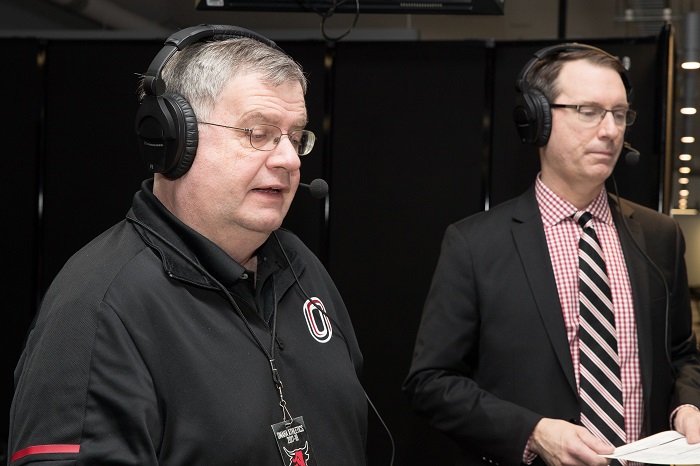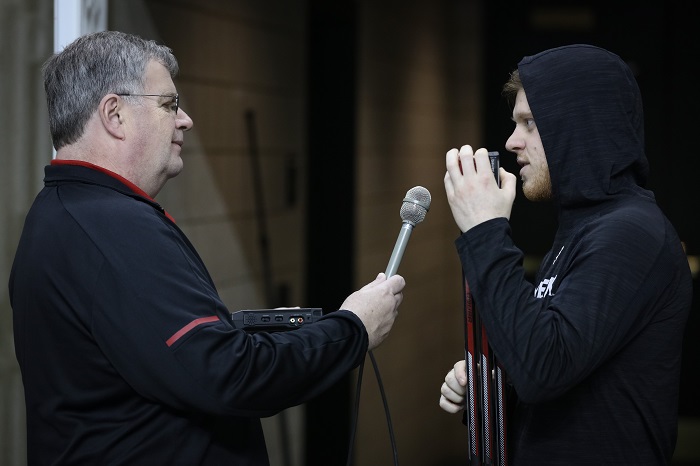
Omaha hockey radio color analyst Terry Leahy never thought he would reach 1,000 broadcasts covering the same team.
On Friday night, when the Mavericks host Augustana, he’ll be there. Quite literally, in fact, in much the same capacity he has held since UNO’s hockey program first hit the ice in 1997.
There have only ever been four Maverick hockey games that Leahy, a self-described Omaha lifer, hasn’t played a role in presenting. And his history with the sport goes back much further.
Leahy grew up watching the Omaha Knights, a former minor league professional team. An early public address announcer for the USHL’s Omaha Lancers, Leahy joined Omaha talk radio station KFAB as a news and sports reporter, a job he still holds.
When UNO announced in 1996 that it would be creating a hockey program, KFAB had not long ago lost broadcasting rights for Nebraska football, for which Leahy had been a sideline reporter.
“That’s how this kind of all started,” Leahy said. “KFAB knew that I was into hockey, and suddenly it was, ‘Alright, you’re on the broadcasts, here you go,’ and nobody else was into it.
“We got in on the ground floor with the beginning of a program, and it was totally right place, right time. Pro hockey and Lancers hockey had been broadcast here before the Mavs, but I was able to develop this color position.”
Leahy was no stranger to UNO athletics. He had previously covered Maverick football, baseball and basketball for Cox Cable’s local access channel, giving him connections with former UNO sports information director Gary Anderson and the late athletic director Don Leahy (no relation). The latter played an integral part in the creation of UNO’s hockey program, and his signature is permanently displayed on the Baxter Arena ice.
Terry Leahy missed two road games, a series at Miami in the mid-2000s, while hospitalized with a stomach illness. The only other UNO games he missed, when the Mavericks won two 2015 regional tournament games at Notre Dame to make what remains the team’s only Frozen Four appearance, came while his wife of 24 years, Sheila, was in the end stages of a cancer battle. Terry stayed in Omaha, as a studio host, for the Mavericks’ national semifinal defeat to Providence.
Sheila would hang on for another month, and throughout that time, the Leahys leaned on their UNO family, from university administrators down to hockey season-ticket holders.
“That all literally became a family when Sheila got sick,” Terry said. “It became a real-life concept, because that was a huge support system that was in my corner. The program, the athletic department, even the university at large, (original UNO hockey coach) Mike Kemp, (former UNO athletic director) Trev Alberts, Chancellor (John) Christensen, they spearheaded a fundraiser with Holy Cross Catholic Church, my faith community, and then I’ve got an incredibly large and fantastic family that I’m blessed with. I had it easy in some ways with that sad situation.
“Steve Rohlik is coaching at Ohio State now, and he was an assistant with Omaha, but he called when Sheila was in trouble with this cancer, and Joe Grimaldi, a former UNO defenseman called. Word had gotten around, and I remembered seeing a bunch of guys at the funeral. It was unbelievable in that regard.”
And Leahy’s emotional attachment to UNO’s hockey program has only grown, surprising as that might’ve been to him.
“I’m 64, will be 65 in January and I’ve often said that over the last 12, maybe 15 years of this or not more, I’ve thought, ‘There’s probably going to become a real gap between me and these student-athletes chronologically, and I’m probably not going to get to know these guys as much as the original group,’ but I’ve been wrong on that,” he said.
“Every year, a new group comes in and you become friends for life with them. There’s a certain friendship that will be there forever.”
And that extends to current UNO coach Mike Gabinet, himself a former Mavericks defenseman who graduated in 2004. Half his life later, Gabinet’s relationship with Leahy now is similar to what it was like back then.

“Terry’s just a tremendous person, and that’s my first thought when I think of him,” Gabinet said. “You can’t help but smile thinking about him. He’s a real supporter of our program, and the genuine people who really care, they’re consistent in their approach, and he’s just that. He cares about the players, the staff, the program, the people around the program and he always does things with class and respect.
“He’s tremendously enjoyable to be around, and he has one of the quietest senses of humor to be around. He’s a funny dude, and he’s a pleasure to have with us on the road. Lots of families and fans get to enjoy the game through his voice, and it’s awesome to have him.”
Leahy sees Gabinet as much the same person he was in his early 20s. That carried over even into UNO’s three-day, two-game set last weekend at Denver. The second game began Saturday night but would finish on Sunday afternoon thanks to bad ice conditions after the first period.
“Mike always took a very positive, studious approach as a player, and has continued that as a coach,” Leahy said. “I think that reflects the fact his dad is a professional educator and football coach in Canada, and his grandfather (Clare Drake) is a coach in the Hockey Hall of Fame.
“Nothing has changed with Mike. That smile, the fist bumps, it’s just awesome. We had to split up to get out of Denver because of the snafu with the ice, and I remember Mike coming up to me with a fist bump and, ‘Hey, Terry, you’re gonna be with me on the way back, just follow me.’ He was leading one group of us on a Southwest flight, and UNO’s director (of hockey operations) was leading a group on a United flight where we all met up again in Omaha. That stuff is typical Gabby.”
The Maverick hockey family got back to Omaha in one piece, and they’ll be together again Friday for what will be an evening to savor.
“With the transitory nature of life in general, and not to be too esoteric there, but especially in broadcasting, I didn’t think we’d get here,” Leahy said of his 1,000th broadcast with the team.
“When this all began, I thought, ‘If I can do this for a little bit, it’d be great, what an experience,’ but then you want to keep going and it has gotten to this point. I still can’t believe it.”


